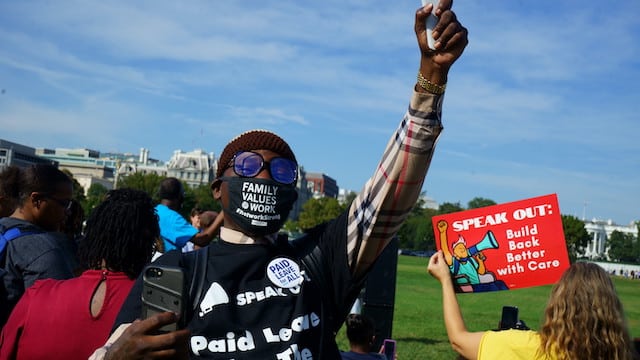Workers seek right to use sick days for loved ones

To this day, Carolyn Pinkston says Aug. 16, 2009, was the worse day of her life.
Early that morning, the 59-year-old single mother found herself without the comfort of loved ones when doctors removed from her brain a tumor that threatened to kill her.
“I knew the Lord had me, but I needed my daughters to be there,” she said. “I was so sick they sent hospice nurses to stay with me, but my daughters were my best advocates.”
Instead, Pinkston’s daughters, Sonya and Tonya, took their mother to the hospital, made sure she was checked in, then headed to work. Any sick leave the sisters had accrued could not be used to care for their mom or any other family member. And had they chosen to take off anyway, supervisors told them their jobs would be on the line.
“I was told, ‘You will not get paid, you cannot use personal time and it would be counted against you,’ ” Tonya Pinkston recalled. “My mom had been there for us for as long as we could remember, and we couldn’t take just this one day to be there for her.”
The Pinkstons are hardly alone. Sonya and Tonya, both of Atlanta, are among an estimated 878,000 workers in Georgia who don’t have access to family care days, said Charmaine Davis, state director of 9to5 Georgia, which advocates for equal pay, family supportive jobs and other workplace issues.
Even worse, Davis said, is that low-wage workers are the least likely to have them. For example, she said, one in three workers in the hospitality and manufacturing industries do not have family care days, forcing them to make a painful choice: safeguard their job and paycheck, or care for a sick loved one.
That’s why 9to5 Georgia, Davis said, is working with state Rep. Katie Dempsey, R-Rome, to pass HB 432, or the Family Care Act, which would allow employees to use their sick days to care for immediate family members.
Although the proposed bill would not require businesses to provide any new benefits or additional sick time, Davis said many businesses don’t see it as good workplace policy.
“We think this is good because it will decrease turnover and increase productivity, employee morale and loyalty,” she said.
Legislative hurdles
Dempsey introduced the bill during the 2012 legislative session, when it received a passing vote in the House Industrial Relations Committee but then died. Dempsey said she’s “very hopeful … to revisit another version of the bill” during the next legislative session, which begins in January.
Rebecca Branstetter, mother of a Grayson High School sophomore and a representative of the Georgia PTA, is backing the legislation.
“The bottom line is sick kids can’t learn,” said Branstetter, who is also a member of the Georgia Job/Family Collaborative, an advocacy group. “They need to stay home, and they need a parent there to make sure that they are OK for the sake of the sick child and the classmates.”
Branstetter said that in some cases when a child is sick, an older sibling is forced to take time off to care for the ailing child because the parent can’t.
“That’s somebody else who is not engaged in teaching and learning because the parent can’t take off,” she said. “Employers, classrooms and workplaces all benefit when working family members are able to keep sick children at home and ensure that ill family members get the care they need.”
Torn on the job
The Pinkstons, all of whom are single moms, are exactly the kind of people who stand to benefit from the Family Care Act.
When their mother was diagnosed with a brain tumor three years ago, Tonya Pinkston had been a customer service representative for a logistics company for about three years, and Sonya Pinkston had worked for a local hospital for more than a decade.
“Until my mom got sick, I showed up every day and gave them my all,” Tonya Pinkston said. “For them not to return the favor when I needed it most was devastating.”
Neither sister could take time off for their mother, but neither of them, they said, were fully present mentally at the jobs they loved.
“When I got to work, I tried my best to do the work, but I was constantly calling, trying to find out what was going on, how she was doing,” Tonya Pinkston said. “It was a day full of fear. That’s why we are really focused on raising awareness about this.”
During a visit with their mother recently, they talked about the tough decision they were forced to make and how demeaning it was to have to choose between their jobs and being present with their sick mom.
“I don’t even have the words, but I think about other people and wonder about their mothers and their children, and I know something has to be done,” Sonya said.